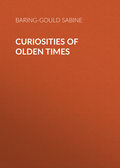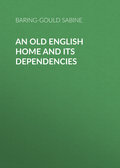
Baring-Gould Sabine
The Broom-Squire
CHAPTER XXXIII
MARKHAM
The funeral of Mrs. Verstage was conducted with all the pomp and circumstance that delight the rustic mind. Bideabout attended, and his hat was adorned with a black silk weeper that was speedily converted by Mehetabel, at his desire, into a Sunday waistcoat.
In this silk waistcoat he started on old Clutch one day for
Guildford, without informing his wife or sister whither he was bound.
The child was delicate and fretful, engaging most of its mother's time and engrossing all her thought.
She had found an old cradle of oak, with a hood to it, the whole quaintly and rudely carved, the rockers ending in snakes' heads, in which several generations of Kinks had lain; in which, indeed, Jonas had spent his early infancy, and had pleaded for his mother's love and clamored for her attention. Whether with the thought of amusing the child, or merely out of the overflow of motherly love that seeks to adorn and glorify the babe, Mehetabel had picked the few late flowers that lingered on in spite of frost, some pinched chrysanthemums, a red robin that had withstood the cold, some twigs of butcher's broom with blood-red berries that had defied it, and these she had stuck about the cradle in little gimlet holes that had been drilled round the edge, probably to contain pegs that might hold down a cover, to screen out glaring sun or cutting draught.
Now, as Mehetabel rocked the cradle and knitted, singing to the sobbing child, the flowers wavered about the infant, forming a wreath of color, and freshening the air with their pure fragrance. Each flower in itself was without much perceptible savor, yet the whole combined exhaled a healthy, clean, and invigorating waft as of summer air over a meadow.
The wreath that surrounded the child was not circular but oblong, almost as though engirding a tiny grave, but this Mehetabel did not see.
Playing the cradle with her foot, with the sun shining in at the window and streaking the foot, she sang —
"My heart is like a fountain true
That flows and flows with love to you;
As chirps the lark unto the tree,
So chirps my pretty babe to me.
And it's O! sweet, sweet! and a lullaby."
But the answer was a peevish moan from the bed. The young mother stooped over the cradle.
"Oh, little lark! little lark! this is no chirp,
Would you were as glad and as gay as the lark!"
Then, resuming her rocking, she sang,
"There's not a rose where'er I seek
As comely as my baby's cheek.
There's not a comb of honey bee,
So full of sweets as babe to me.
And it's O! sweet, sweet! and a lullaby."
Again she bowed over the crib, and all the rocking flowers quivered and stood still.
"Baby, darling! Why are there such poor roses in your little cheek? I would value them above all the China roses ever grown! Look at the Red Robin, my sweet, my sweet, and become as pink as is that."
"There's not a star that shines on high
Is brighter than my baby's eye.
There's not a boat upon the sea
Can dance as baby does to me.
And it's O! sweet, sweet, and a lullaby."
"No silk was ever spun so fine
As is the hair of baby mine.
My baby smells more sweet to me
Than smells in spring the elder tree.
And it's O! sweet, sweet, and a lullaby!"
The child would not sleep.
Again the mother stayed the rocking of the cradle, and the swaying of the flowers.
She lifted the little creature from its bed carefully lest the sharp-leafed butcher's broom should scratch it. How surrounded was that crib with spikes, and they poisonous! And the red berries oozed out of the ribs of the cruel needle-armed leaves, like drops of heart's blood.
Mehetabel took her child to her bosom, and rocked her own chair, and as she rocked, the sunbeam flashed across her face, and then she was in shadow, then another flash, and again shadow, and from her face, when sunlit, a reflection of light flooded the little white dress of the babe, and illumined the tiny arm, and restless fingers laid against her bosom.
"A little fish swims in the well,
So in my heart does baby dwell.
A little flower blows on the tree,
My baby is the flower to me.
And It's O! sweet, sweet! and a lullaby!"
A wondrous expression of peace and contentment was on Mehetabel's face. None of the care and pain that had lined it, none of the gloom of hopelessness that had lain on it, had left now thereon a trace. In her child all her hope was centred, all her love culminated.
"The King has sceptre, crown and ball.
You are my sceptre, crown and all,
For all his robes of royal silk.
More fair your skin, as white as milk.
And it's O! sweet, sweet, and a lullaby!
"Ten thousand parks where deer may run,
Ten thousand roses in the sun.
Ten thousand pearls beneath the sea.
My babe, more precious is to me.
And it's O! sweet, sweet, and a lullaby!"
Presently gentle sleep descended on the head of the child, the pink eyelids closed, the restless hand ceased to grope and clutch, and the breath came evenly. Mehetabel laid her little one again in its cradle, and recommenced the rocking with the accompanying swaying of the flowers.
Now that the child was asleep Mehetabel sat lightly swinging the cradle, afraid to leave it at rest lest that of her infant should again be broken.
She thought of the death of her almost mother Susanna Verstage, the only woman that had shown her kindness, except the dame of the school she had attended as a child.
Mehetabel's heart overflowed with tender love towards the deceased, she fully, frankly forgave her the cruel blow whereby she had wounded her, and had driven her out of her house and into that of Jonas. And yet it was a deadly wrong: a wrong that could never be redressed. The wound dealt her would canker her heart away; it was of such a nature that nothing could heal it. Mehetabel was well aware of this. She could see brightness before her in one direction only. From her child alone could she derive hope and joy in the future. And yet she forgave Mrs. Verstage with a generous forgiveness which was part of her nature. She would forgive Jonas anything, everything, if he would but acknowledge his wrong, and turn to her in love.
And now she found that she could think of Iver without a quickening of her pulses.
In her love for her babe all other loves had been swallowed up, refined, reduced in force. She loved Iver still, but only as a friend, a brother. Her breast had room for one prevailing love only – that of her child.
As she sat, slightly rocking the cradle, and with a smile dimpling her cheek, a knock sounded at the door, and at her call there entered a young man whom she had seen during the winter with Jonas. He was a gentleman, and she had been told that he had lodged at the Huts, and she knew that he had engaged the Broom-Squire to attend him, when duck-shooting, at the Fransham ponds.
Mehetabel apologized for not rising as he entered, and pointed to the cradle.
"My name is Markham," said the young man, "I have come to see Mr.
Kink. This is his house, I believe?"
"Yes, sir; but he is not at home."
"Will he be long absent?"
"I do not know. Will you please to take a chair?"
"Thank you." The young gentleman seated himself, wiped his brow, and threw his cap on the floor.
"I want some fishing. I made Mr. Kink's acquaintance, shooting, during the winter. Excuse me, are you his sister or his wife?"
"His wife, sir."
"You are very young."
To this Mehetabel made no reply.
"And uncommonly pretty," pursued Mr. Markham, looking at her with admiration. "Where the deuce did the Broom-Squire pick you up?"
The young mother was annoyed – a little color formed in her cheek.
"Can I give a message to Jonas?" she asked.
"A message? Tell him he's a lucky dog. By heaven! I had no idea that a pearl lay at the bottom of the Punch-Bowl. And that is your baby?"
"Yes, sir."
Mehetabel lightly raised the sheet that covered the child's head.
The stranger stooped and looked at the sleeping child, that seemed to be made uneasy by his glance, and turned moaning away.
"It looks as if it were for another world – not this," said the gentleman.
The flush spread over Mehetabel's brow. "Sir," she said in a fluttering voice, "You are not a doctor, are you?"
"Oh, dear, no! – a barrister."
"Then," said she, in a tone of relief, "you do not know. The child is very well, but young."
"That may be."
The young man returned to his seat.
"I have left a fishing-rod outside," he said. "I wanted Kink to accompany me on one of the ponds where there is a punt. There must be plenty of fish in these sheets of water?"
"I believe there are, sir. As Jonas is away, perhaps Samuel Rocliffe can help you. He is my husband's nephew, and lives in the cottage, a little further down."
"Thank you, I'll look him up. But, hang me, if I like to leave – with such attractions here I do not care to leave."
After standing, considering a moment, hardly taking his eyes off Mehetabel, he said – "My pretty little hostess, if ever I begrudged a man in my life, I begrudge Jonas Kink – his wife. Come and tell me when you find him intolerable, and see if I cannot professionally help you to be rid of such a curmudgeon. Who knows? – the time may come! My name is Markham."
Then he departed.
CHAPTER XXXIV
THE PICTURE
Meanwhile Bideabout was on his way to the town of Guildford. He made slow progress, for old Clutch had no mind for speed. The horse was mistrustful as to whither he was going, and how he would be treated on reaching his destination. No amount of beating availed. He had laid on his winter growth of hair, which served as a mat, breaking the force of the strokes administered. He was proof against kicks, for whenever Jonas extended his legs for the purpose of bringing his heels sharply against the sides of Clutch, the old horse drew a deep inspiration and blew himself out; thus blunting the force of the heels driven into him.
At length, however, Jonas and old Clutch did reach Guildford. To old Clutch's great astonishment he found himself in a town new to him, more populous than Godalming; and being strongly convinced that he had done enough, and that every house was an inn open to receive him, and being eager to make himself comfortable, he endeavored to carry his master into a china-shop, then into a linen-draper's shop, and next into a green-grocer's.
Jonas was constrained to stable his obstinate steed in the first tavern he came to, and to make the rest of his way on foot.
Guildford is, to this day, a picturesque old town, dominated by the ruins of a fine royal castle, and with a quaint Grammar School and hospital. At the present time it is going through immense transformation. It has become a favorite retiring place for old officers of the army, supplanting in this respect Cheltenham. But at the period of this tale it was a sleepy, ancient, county town that woke to life on market days, and rested through the remainder of the week. It did not work six days and keep one Sabbath, but held the Sabbath for six days and woke to activity on one only.
Now nobody quite knows who are all the new people that flow into the villas, and flood the suburbs. At the period whereof we tell there were no invaders of the place. Everybody knew every one else in his own clique, and knew of and looked down on every one else in the clique below him, and thanked God that he only knew of him, and did not know him; and looked up at and slandered every one else in the clique above him.
At the time of which we tell there was no greater joy to those in each of the many cliques than to be able to stare at those who belonged to a clique esteemed lower, and to ask who those people were, and profess never to have heard their names, and to wonder out of what dungheap they had sprung.
At that time the quintessence of society in the town consisted of such as were called upon and returned the calls of the county families. Now, alas, almost every country gentleman's house in the neighborhood is no longer occupied by its ancient proprietors, and is sold or let to successful tradespeople, so that the quintessence of society in the town plumes itself on not knowing the occupants of these stately mansions.
At that time the family that inhabited a house which had been built fifty years before regarded with contempt those who occupied one built only thirty years before. At that time those who had a remote connection by cousinship twice removed with an Honorable, deemed themselves justified in considering every one else, not so privileged, as dishonorable.
Now all this is past, or is in process of passing away, and in Guildford and its suburbs, as elsewhere, the old order changeth, and the poll of a Parish Council teaches men their levels in the general estimation.
Without much difficulty, Jonas Kink was able to discover where the artist, Iver Verstage, had his house and his studio. The house was small, in a side street, and the name was on the door.
Jonas was ushered into the workshop by an elderly maid, and then saw Iver in a blouse with his arms tied about with string; a mahl-stick in one hand and a brush in the other.
Iver was surprised to see the Broom-Squire, and indisposed to welcome him. He purposely retained stick and brush in his hands, so as not to be able to strike palms with the man who had deprived him of the woman he admired and loved best in the world; and whom he suspected of misusing her.
Jonas looked about the studio, and his eye was caught by a picture of Mehetabel at the well head. The young artist had devoted his best efforts to finishing his study, and working it up into an effective and altogether charming painting.
The Broom-Squire held in the right hand the stick wherewith he had thrashed old Clutch, and this he now transferred to the left, whilst extending his right hand and forcing a smile on his leathery face. The artist made a pretence of seeking out some place where he could put down the articles encumbering his hands, but finding none, he was unable to return the salutation.
"Let bygones be bygones," said Jonas, and he dropped his hand. "Fine pictur' that, very like my wife. What, now, have you sold that for?"
"It is not sold at all. I do not think I shall part with the painting."
"Why not?" asked Jonas, with a malevolent twinkle in his eyes and a flush on his cheek-bones.
"Because it is a good sample of my ability which I can show to such as come as customers, and also because it reminds me of an old friend."
"Then you may take my portrait," said Jonas, "and sell this. Mine will do as well, and you knowed me afore you did Matabel."
"That is true," laughed Iver, "but I am not sure that you would make so striking subject, so inspiring to the artist. Did you come all the way from the Punch-Bowl to see the painting?"
"No, I didn't," answered Jonas.
"Then had you business in the town?"
"None particular."
"Was it to give me the pleasure of seeing you and asking after old friends at Thursley?"
"Old friends," sneered Bideabout; "much the like o' you cares for them as is old. It's the young and the bloomin' as is to your fancy. And I reckon it ain't friends as you would ask about, but a friend, and that's Matabel. Well, I don't mind tellin' of yer that she's got a baby, but I s'pose you've heard that, and the child ain't over strong and healthy, such as ort to be in the Punch-Bowl, where we're all hard as nails."
"Aye, not in physique only?"
"I don't know nothin about physic. I didn't take it when I were poorly, and nobody ever did in the Punch-Bowl as I've heard tell on. I sent once to Gorlmyn (Godalming) for a sleepin' draught, when I were bad wi' that shot in my shoulder as you knows of. But I never took it, not I."
"So you've come to see me?"
"Oh, yes, I've come, civil and neighbor-like, to see you."
"What about? Will you sit down?"
"Thanky, I just about like to stand. Yes, I've come to see you – on business."
"On business!"
"Yes, on business. You're trustee, I hear, for the child."
"To be sure I am. Mother put away a hundred pounds, and father has added fifty to it – and it is for your little one, some day."
"Well," said Jonas, "what I've come about is I wants it now."
"What, the hundred and fifty pounds?"
"Aye, I reckon the hundred and fifty pounds."
"But the money is not left to you."
"I know it b'aint; I want it for the child."
"You are not going to have it."
"Look here. Master Iver Verstage, you never ort to ha' been made trustee for my child. It's so much as puttin' a slight and an insult on me. If that child be mine then I'm the one as should have the trust. Don't I know best what the child wants? Don't I know best how to lay it out for its advantage? The money ort to ha' been put in my hands and in none other. That's my opinion."
"Bideabout!" answered Iver, "it is not a question as to what my father and mother should have done. I did not seek to be made trustee. It was a freak on the part of my dear mother. As she has done it, there it is; neither you nor I can alter that."
"Yes. You can renounce trusteeship."
"That will not help. Then I suppose the money would go into Chancery, and would be consumed there without any of it reaching the child."
Jonas considered, and then shook his head.
"You can hand it over to me."
"Then I should be held responsible and have to refund when the little fellow comes of age."
"He may never come of age."
"That neither you nor I can tell."
"Now look here," said the Broom-Squire, assuming an air of confidence, "between you and me, as old acquaintances, and me as gave you the feathers out o' a snipe's wing to make your first brush – and, so to speak, launched you in your career of greatness – between you and me I'm in an awkward perdic'ment. Through the failure of the Wealden Bank, of which you've heard tell, I've lost pretty much everything as I had managed to save through years of toil and frugality. And now I'm menaced in my little property. I don't know as I shall be able to hold it, unless some friend comes to the help. Well, now, who'll that little property go to but my son – that there precious darlin' baby as we're talkin' about. He'll grow out o' his squawlin', and he'll want his property unincumbered and clear, as it came to me. That I can't give him unless helped. I don't ask that there hundred and fifty pounds for myself. I know very well that I can't have it for myself. But I demand it for the child; it is now or never can the little estate in the Punch-Bowl be saved from fallin' into the hands of them darned lawyers. A stitch in time saves nine, and a little help now may be all that is wanted to keep the property clean and clear and unembarrassed wi' debt. If once we get our heads under water we'll all get drowned, me and Matabel and the kid – sure as crabs ain't garden apples."
"That may be very true, Bideabout," answered Iver, "but for all that I cannot let the money out of my control."
"Ain't you bound to spend it on the child?"
"I am bound to reserve it whole and intact for the child."
"But can you not see," persisted Jonas, "that you are doing that for the child, it would wish above all, when come to years of discretion."
"That is possible, but my hands are tied."
"In truth you will not."
"I cannot."
"I don't believe you. It is because you want to spite me that you will not help."
"Not at all, Bideabout. I wish well to the child and its mother, and, of course, to you. But I cannot break a trust."
"You will not?"
"If no other word will suit you – be it so – I will not."
Jonas Kink fumed blood red.
"You think to have me there. I shouldn't be surprised but it's you who are at the bottom of all – and will buy me up and buy me out, that you and Matabel may have the place to yourselves. It shall never be. I know what was meant when Sanna Verstage made you trustee. I am to be reckoned with. I can assure you of that. I shall find means to keep my property from you and my wife also."
He raised his stick and fell to beating the picture of Mehetabel with it; till it was rent to rags.
"Not even her picture shall you have – and I would it were her I were slashin' and breakin' to pieces as I've done to this picture. It may come to that in the end – but out of my power and into your hands she shall never go."






